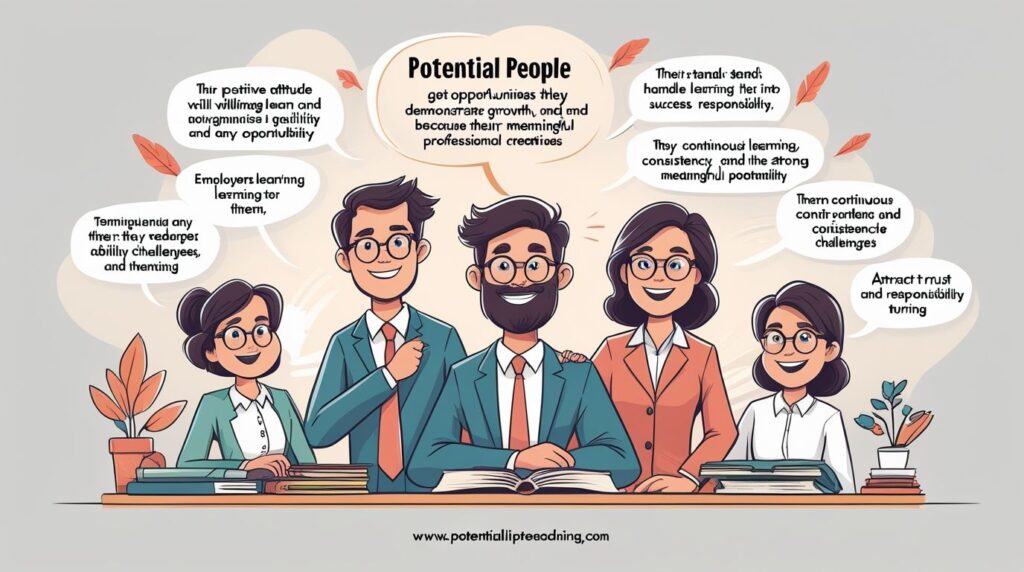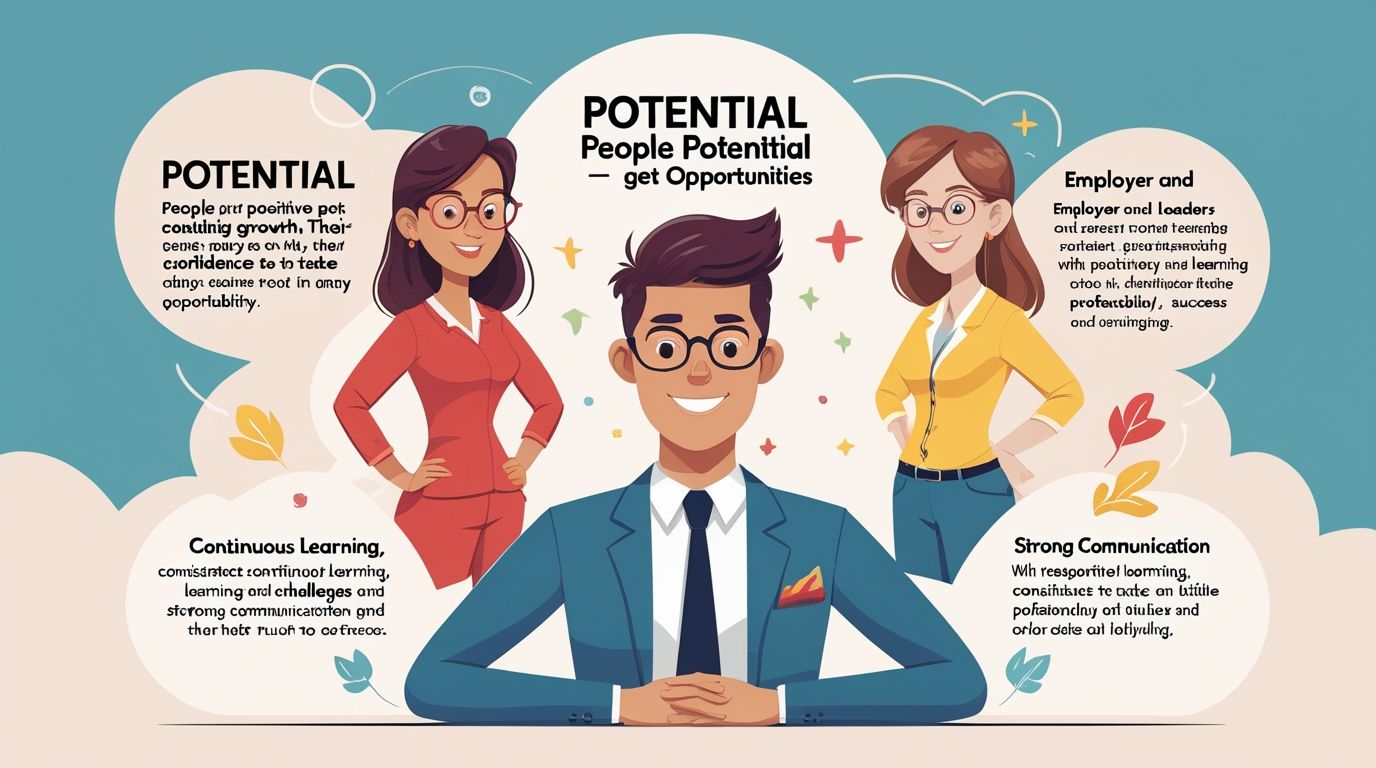Introduction
Why Potential People Get Opportunities, In every professional field, potential people often attract more opportunities than others. Their ability to show capability, motivation, and growth mindset makes them stand out. Employers, leaders, and organizations seek individuals who not only perform well but also show promise for future development. Having potential means possessing qualities like adaptability, creativity, and the willingness to learn. These traits naturally invite opportunities for progress. Moreover, potential people inspire confidence in others. They radiate an aura of commitment that convinces others they can handle challenges effectively. Therefore, opportunities flow toward them because they exhibit the readiness to take initiative and transform ideas into results.
Understanding the Meaning of Potential
The term potential refers to the hidden capabilities or talents within an individual that can be developed with effort and experience. It is not just about current achievements but about what a person can achieve in the future. A person with potential shows consistency, curiosity, and problem-solving ability. They look beyond immediate tasks and aim for long-term excellence. In workplaces and learning environments, people with potential are identified as future leaders. Their willingness to take feedback, learn from failure, and adapt to change demonstrates their growth-oriented attitude. In essence, potential is the promise of greatness that lies within an individual, waiting to be realized through effort, persistence, and opportunities.
Why Opportunities Gravitate Toward Potential People
Opportunities are naturally drawn to potential people because they exhibit drive, resilience, and a positive attitude. They are proactive rather than reactive. Instead of waiting for chances, they prepare for them. Their commitment to learning and self-improvement makes them visible to decision-makers. When others notice their enthusiasm and dependability, they become the first choice for new responsibilities. Furthermore, potential people often align their goals with organizational or social missions. This alignment ensures that they are trusted with greater opportunities. As a result, they continuously grow, proving that potential attracts opportunity when effort and preparation go hand in hand.
The Role of Hard Work in Unleashing Potential
Even though potential is natural, hard work plays a key role in turning it into success. Many people possess talent, but only those who work consistently are able to use it effectively. Hard work amplifies potential and turns ideas into results. It creates discipline and strengthens focus. Moreover, continuous effort leads to improvement and skill refinement. Employers value individuals who combine potential with perseverance. They see them as assets who can handle long-term projects. In short, potential provides the spark, but hard work provides the fuel that keeps it alive. Without dedication and consistent practice, even the greatest potential may remain hidden or unused.
Self-Belief and Confidence as Opportunity Magnets
Confidence is the visible form of potential. People with strong self-belief demonstrate their worth through action and attitude. This confidence inspires trust from others and opens doors for new experiences. Potential people believe that challenges are opportunities to grow rather than obstacles to fear. They display calmness under pressure and a solution-oriented mindset. Moreover, their belief in their own abilities encourages others to invest in them. Confidence communicates reliability and strength, both of which are essential for leadership and collaboration. Therefore, when people believe in their potential, the world tends to believe in them too, offering more chances for progress.
Continuous Learning Enhances Potential
In today’s fast-changing world, continuous learning separates potential people from the rest. They understand that knowledge evolves and skills must be upgraded regularly. By staying open to learning, they maintain relevance and readiness for new challenges. Potential people take advantage of workshops, courses, and mentorships to sharpen their expertise. This habit of lifelong learning signals adaptability and curiosity—two qualities that employers and leaders value highly. Moreover, learning increases confidence and creativity, helping individuals see opportunities where others see problems. Thus, continuous learning acts as a bridge that connects inner potential to real-world opportunities, ensuring long-term professional and personal growth.

Positive Attitude and Emotional Intelligence
A positive attitude and emotional intelligence (EQ) are powerful traits of potential people. They maintain optimism even in difficult situations, which makes them trustworthy and pleasant to work with. Emotional intelligence allows them to understand others’ feelings and respond thoughtfully. This emotional maturity fosters collaboration and effective communication. Because they can manage stress and relationships wisely, potential people become natural leaders. They build harmony in teams and solve conflicts smoothly. Furthermore, positivity attracts support and mentorship from others. In any organization, individuals with emotional intelligence rise faster because they connect both emotionally and professionally with others, thus gaining more opportunities for advancement.
Effective Communication Reflects Potential
Effective communication is one of the most visible signs of potential. People who can express ideas clearly are often chosen for leadership roles. They use language to motivate, persuade, and inspire others. Moreover, clear communication reflects confidence and intelligence. Potential people are not only good speakers but also active listeners. They understand that listening leads to better understanding and collaboration. Additionally, good communication helps build strong relationships, which often lead to new opportunities. When people communicate effectively, they are seen as capable of managing projects, guiding teams, and representing organizations. Thus, communication becomes a tool through which potential is recognized and rewarded.
Networking and Relationship Building
Building strong professional relationships plays a crucial role in how potential people get opportunities. Networking helps them connect with mentors, peers, and leaders who can guide their growth. Through collaboration and visibility, they make their skills and ideas known. Networking also exposes them to new perspectives and industries, expanding their horizon. Potential people know that success is rarely achieved alone; it grows through meaningful connections. Therefore, they engage positively with others, participate in community work, and share knowledge. This cooperative spirit not only strengthens their reputation but also invites more opportunities from people who value trust, reliability, and collaboration.
Innovation and Creativity as Growth Drivers
Innovation is a major reason why potential people rise quickly. They think differently and bring fresh ideas to the table. Their creativity leads to problem-solving and efficiency. Whether in education, business, or technology, innovative individuals help organizations stay competitive. Leaders notice and reward this creativity with greater responsibilities and projects. Moreover, innovation shows initiative—it proves that a person is not afraid to take risks for progress. Such people become catalysts for change and development. In essence, creativity helps potential people stand out, showing that they can shape the future, not just follow it. This forward-thinking mindset attracts endless opportunities.
Adaptability to Change
Change is constant, and adaptability defines how people handle it. Potential individuals quickly adjust to new environments, technologies, and systems. This flexibility demonstrates emotional strength and problem-solving ability. When facing challenges, adaptable people stay calm and resourceful. Organizations prefer such individuals because they ensure stability even during transitions. Furthermore, adaptability encourages learning and experimentation, two traits linked with potential. Being open to change helps people explore opportunities others might avoid. Ultimately, adaptability transforms uncertainty into a platform for growth. The more one adapts, the more doors open, as it proves resilience, creativity, and a solution-driven mindset—all hallmarks of potential.

Commitment and Consistency in Actions
Consistency is what turns potential into achievement. Potential people are consistent in their work ethic, punctuality, and behavior. They do not rely on luck or talent alone; instead, they maintain steady performance. Their commitment earns trust from superiors and peers. Moreover, consistent individuals show reliability, which is key for leadership and management roles. Over time, their persistence builds a positive reputation, leading to more opportunities. People recognize that they can be counted on in both good and difficult times. Therefore, consistency and commitment act as silent indicators of potential, proving that dependable effort always attracts attention and rewards.
Leadership Qualities and Initiative
True potential shines through leadership and initiative. Potential people do not wait to be told what to do—they take charge. Their proactive nature helps them identify problems and find solutions before others notice them. Leadership also involves motivating and guiding others toward shared goals. These individuals promote teamwork, communication, and fairness. Consequently, leaders and managers recognize them as future leaders. Taking initiative also displays courage and confidence, both of which are essential for personal and organizational growth. In every environment, opportunities follow those who lead, innovate, and take responsibility rather than those who remain passive.
Handling Failure Positively
One of the strongest indicators of potential is how a person handles failure. Instead of giving up, potential people treat failure as a lesson. They analyze mistakes, adapt, and return stronger. This resilience builds mental strength and experience. Failure also tests commitment; those who continue to try prove their dedication. Employers and mentors value such persistence. It shows that the person is reliable even in uncertain situations. Moreover, learning from failure leads to growth, creativity, and emotional maturity. As a result, potential individuals turn setbacks into stepping stones. Their optimistic approach to challenges ensures that opportunities always find their way to them.
Why Organizations Value Potential People
Modern organizations prefer potential people over those with just experience. They look for employees who can grow, lead, and innovate in the future. Potential individuals represent long-term investment value. They bring energy, vision, and adaptability, all crucial in a competitive world. Moreover, their attitude influences others positively, creating a culture of productivity. Companies that identify and nurture potential often achieve sustainable growth. In essence, organizations understand that potential-driven employees not only fulfill tasks but also transform systems. Therefore, they actively search for people who show both current capability and future promise, giving them greater opportunities to shine.
Final Thoughts: The Link Between Potential and Opportunity
In conclusion, potential people get opportunities because they display qualities that inspire confidence, creativity, and trust. Their growth mindset, adaptability, communication skills, and leadership qualities make them invaluable assets. Opportunities do not simply appear by chance—they are created through consistent effort, learning, and positive energy. Those who believe in their abilities and continuously improve themselves attract the right chances at the right time. In life and career, potential combined with action creates success. Therefore, anyone who wishes to get opportunities must first develop inner potential and let it guide their journey toward achievement.
References
- Dweck, C. S. (2016). Mindset: The New Psychology of Success. Random House.
- Goleman, D. (1995). Emotional Intelligence: Why It Can Matter More Than IQ. Bantam Books.
- Grant, A. (2013). Give and Take: Why Helping Others Drives Our Success. Penguin Books.

Thanks for addressing this topic—it’s so important.
Turkey tour packages Outstanding Turkey vacation packages. The Kaçkar Mountains trek was challenging but the views were worth every step. https://skillifier.com/?p=61511
Very relevant and timely content. Appreciate you sharing this.
I appreciate the depth and clarity of this post.
What an engaging read! You kept me hooked from start to finish.
Your thoughts are always so well-organized and presented.
Turkey historical tours Outstanding Turkey tour packages. The attention to detail and customer service was exceptional. https://lacataora.com/?p=7881
I wasn’t sure what to expect at first, but this turned out to be surprisingly useful. Thanks for taking the time to put this together.
Posts like this are why I keep coming back. It’s rare to find content that’s simple, practical, and not full of fluff.
This made me rethink some of my assumptions. Really valuable post.
Aegean tours Turkey Kevin W. – Lüksemburg https://2emevie.tech/?p=5316
I enjoyed your take on this subject. Keep writing!
The way you write feels personal and authentic.
I love how practical and realistic your tips are.
**mind vault**
mind vault is a premium cognitive support formula created for adults 45+. It’s thoughtfully designed to help maintain clear thinking
What an engaging read! You kept me hooked from start to finish.
I appreciate the depth and clarity of this post.
**sugarmute**
sugarmute is a science-guided nutritional supplement created to help maintain balanced blood sugar while supporting steady energy and mental clarity.
**glpro**
glpro is a natural dietary supplement designed to promote balanced blood sugar levels and curb sugar cravings.
Solid article! Thinking about responsible gaming is key, and platforms like ninong gaming link seem to be streamlining access for Filipino players with those localized payment options – a smart move for wider adoption. Good read!
**prodentim**
prodentim an advanced probiotic formulation designed to support exceptional oral hygiene while fortifying teeth and gums.
**synaptigen**
synaptigen is a next-generation brain support supplement that blends natural nootropics, adaptogens
**breathe**
breathe is a plant-powered tincture crafted to promote lung performance and enhance your breathing quality.
**potentstream**
potentstream is engineered to promote prostate well-being by counteracting the residue that can build up from hard-water minerals within the urinary tract.
**sleep lean**
sleeplean is a US-trusted, naturally focused nighttime support formula that helps your body burn fat while you rest.
2k5qsy
**memory lift**
memory lift is an innovative dietary formula designed to naturally nurture brain wellness and sharpen cognitive performance.